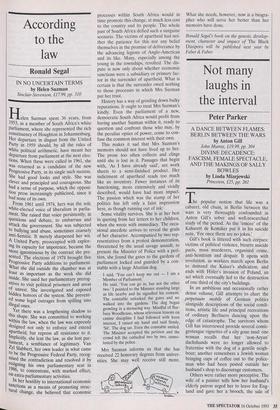According to the law
Ronald Segal
IN NO UNCERTAIN TERMS by Helen Suzman Sinclair-Stevenson, £1799, pp. 310 by Helen Suzman Sinclair-Stevenson, £1799, pp. 310 Helen Suzman spent 36 years, from 1953, as a member of South Africa's white parliament, where she represented the rich constituency of Houghton in Johannesburg. Tier departure in disgust from the United Party in 1959 should, by all the rules of white political arithmetic, have meant her departure from parliament at the next elec- tions. When these were called in 1961, she was returned as a candidate of the new Progressive Party, in its single such success. She had good looks and style. She was clever and principled and courageous. She had a sense of purpose, which the opposi- tion press increasingly publicised, since it had none of its own.
From 1961 until 1974, hers was the sole white-elected voice of liberalism in parlia- ment. She raised that voice persistently, in questions and debate, to embarrass and attack the government. She was subjected to bullying and abuse, sometimes coarsely anti-Semitic. It merely sharpened her wit. A United Party, preoccupied with explor- ing its capacity for impotence, became the more ignominious by the contrast she pre- sented. The elections of 1974 brought five Progressive Party additions to parliament. What she did outside the chamber was at least as important as the work she did inside. She used her parliamentary prerog- atives to visit political prisoners and areas of unrest. She investigated and exposed hidden horrors of the system. She prevent- ed some legal outrages from spilling into illegal ones.
Yet there was a lengthening shadow to this shape. She was committed to working within the law, when the law was expressly designed not only to enforce and extend apartheid, but repress all resistance to it. Implicitly, she lent the law, as she lent par- liament, a semblance of legitimacy. Van Zyl Slabbert, her own leader in what came to be the Progressive Federal Party, recog- nised the contradiction and resolved it by resigning his own parliamentary seat in 1986, to concentrate, with marked effect, 1311 extra-parliamentary activities.
In her hostility to international economic sanctions as a means of promoting struc- tural change, she believed that economic processes within South Africa would in time promote this change, at much less cost to the country and its people. The whole past of South Africa defied such a sanguine scenario. The victims of apartheid had nei- ther the patience for this nor any belief themselves in the promise of deliverance by the advancing legions of Anglo-American and its like. Many, especially among the young in the townships, revolted. The dis- pute is now only about whether economic sanctions were a subsidiary or primary fac- tor in the surrender of apartheid. What is certain is that the surrender owed nothing to those processes in which Mrs Suzman put her trust. History has a way of grinding down bulky reputations. It ought to treat Mrs Suzman's kindly. Even the parliament of a new, democratic South Africa would profit from having another Suzman within it, ready to question and confront those who may, by the peculiar optics of power, come to con- fuse the common interest with their own.
This makes it sad that Mrs Suzman's memoirs should not have lived up to her. The prose too often collects and clings until she is lost in it. Passages that begin with, 'As I have already said', are work sheets to a semi-finished product. Her indictment of apartheid reads too much like an inventory. Fewer instances of its functioning, more extensively and vividly described, would have had more impact. The passion which was the stamp of her politics has left only a faint impression here, as though running out of ink. Some vitality survives. She is at her best in quoting from her letters to her children, when she wrote with immediacy. The occa- sional anecdote arrives to reveal the grain of her character. Accompanied by two rep- resentatives from a protest demonstration, threatened by the usual savage assault, to present the Minister of Police with a peti- tion, she found the gates to the gardens of parliament locked and guarded by a con- stable with a large Alsatian dog.
I said, 'You can't keep me out — I am a Member of Parliament.'
He said, 'You can go in, but not the other two.' I pointed to the Minister standing large as life nearby and he signalled his consent. The constable unlocked the gates and we walked into the gardens. The dog began growling in a menacing way. Mindful of Bar- bara Woodhouse, whose television lessons on canine discipline I had followed with keen interest, I raised my hand and said firmly, `Sit'. The dog sat. Even the constable smiled. The Minister accepted the petition and the crowd left the cathedral two by two, unmo- lested by the police.
Mrs Suzman informs us that she has received 22 honorary degrees from univer- sities. She may well receive still more. What she needs, however, now is a biogra- pher who will serve her better than her memoirs have done.
Ronald Segal's book on the genesis, develop- ment, character and impact of The Black Diaspora will be published next year by Faber & Faber.


























































 Previous page
Previous page